Overview of the importance of choosing the right dry cat food for cats with sensitive stomachs
Choosing the right dry cat food is crucial for cats, according to Best Dry Cat Food for Sensitive Stomachs. It affects their health and well-being. A proper diet can help reduce digestive issues. It ensures your cat has a happy and comfortable life. Cats with sensitive stomachs need special food. It must be easy to digest and have high-quality, limited ingredients. This reduces the risk of harmful reactions.
Picking the right dry cat food involves looking for products. They should have a balance of key nutrients: proteins, fats, and carbs. The nutrients should be tailored to the special needs of sensitive cats. It’s important to avoid foods with fake additives, colors, and flavors. These can worsen digestive problems. Instead, choose natural ingredients. They support gut health, like prebiotics and probiotics. These help maintain a healthy intestinal flora.
Moreover, the importance of hydration cannot be overstated for cats with sensitive stomachs. Dry food is convenient. But it’s vital for your cat to always have fresh water. This helps digestion and prevents dehydration. Consult a vet to choose a diet that fits your cat’s health needs. It can also give invaluable guidance. This will ensure your cat gets the best care. Investing time and effort into picking the right dry cat food can lead to a happier, healthier pet. It reduces the chance of digestive issues and improves quality of life.
Explanation of what causes sensitive stomachs in cats and signs to look out for
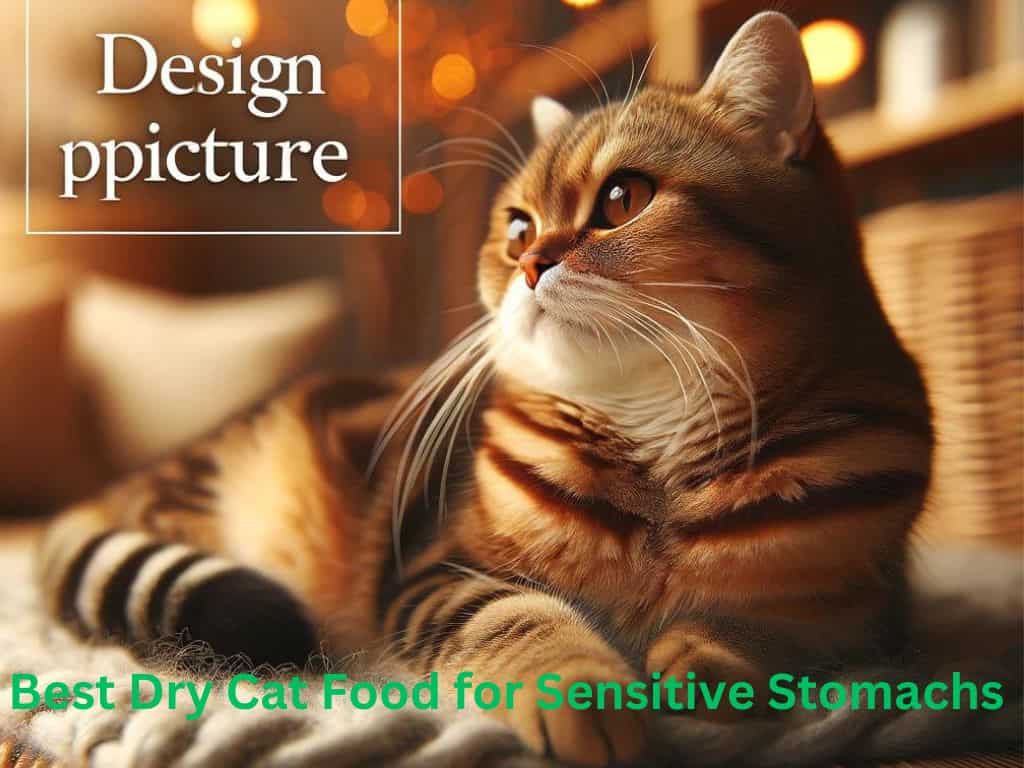
Many things can cause cats to have sensitive stomachs. These range from diet problems to hidden health conditions. One common cause is an intolerance or allergy to certain ingredients in their food. These include proteins, grains, or additives. These intolerances can cause inflammation in the gut. This inflammation disrupts digestion.
Another possible cause is chronic conditions. These include inflammatory bowel disease (IBD). They can affect the cat’s ability to digest and absorb nutrients. Infections, whether bacterial, viral, or parasitic, can also upset a cat’s gut. They can lead to sensitivities.
Stress and anxiety are also significant. They affect the gut-brain axis and cause sensitive stomach symptoms. Also, fast diet changes without a proper transition can upset a cat’s stomach. Their digestive systems need time to adjust to new foods.
Cats with a sensitive stomach vomit a lot. They also have diarrhea, constipation, gas, and belly pain. Cats may also eat less due to discomfort. Or, they may show increased hunger if their body isn’t absorbing nutrients. Unexplained weight loss and changes in coat condition are signs of digestive issues. Coat changes include dullness and shedding. Watching these signs and asking a vet can help find the cause. It can also help manage your cat’s sensitive stomach.
Detailed breakdown of the essential nutrients needed in dry cat food for sensitive stomachs
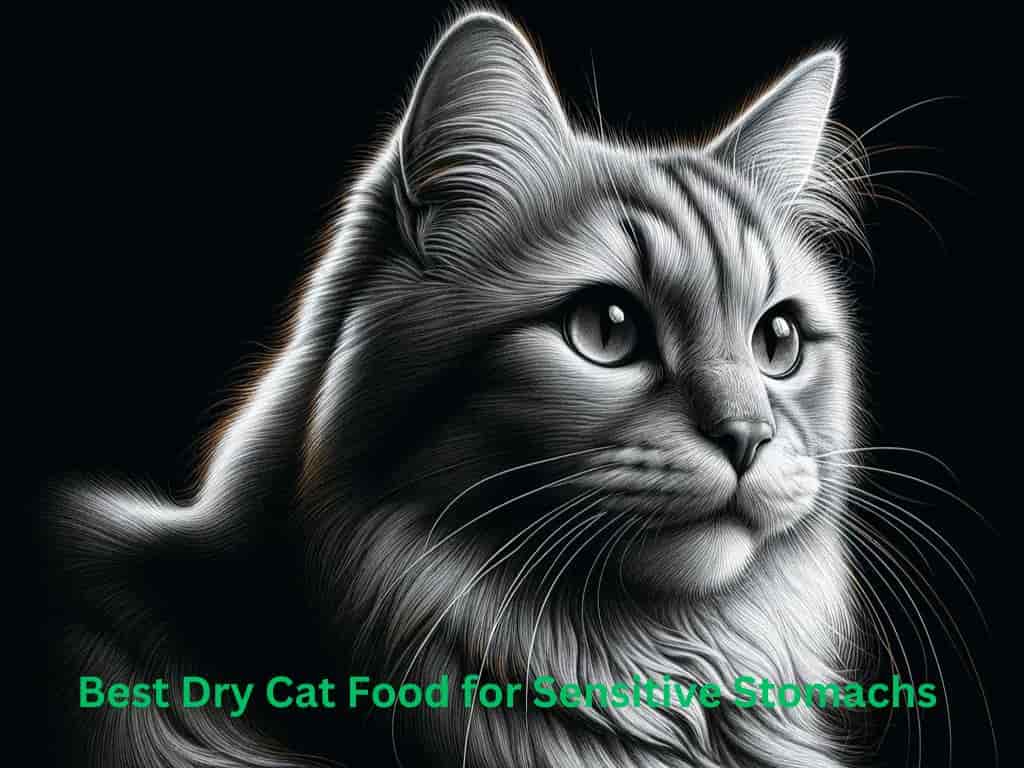
Cats have sensitive stomachs. The composition of their dry food is critical to their health. A detailed breakdown of essential nutrients in their diet includes:
1. High-Quality Protein. Protein is the cornerstone of a cat’s diet. But, for those with sensitive stomachs, they should eat digestible sources. These include chicken, turkey, or fish. These sources provide the amino acids muscles need. They do so without causing stress on digestion.
2. Cats need fewer carbohydrates than humans or dogs. But, they can enjoy digestible sources like rice and oatmeal. These foods can help cats with sensitive stomachs. These carbs offer a gentle source of energy and help to bind the food together.
3. Fiber is important. It aids digestion and keeps bowels healthy. You need a moderate amount. Pumpkin or beet pulp can provide this fiber. They do not irritate the stomach.
4. Fats are a key energy source. Omega-3 fatty acids, found in fish oil, are especially important for skin and a shiny coat. Yet, the fat content should be balanced to avoid digestive upset.
5. Vitamins and Minerals: Essential vitamins and minerals must be in a balanced diet. They support bone health and the immune system. For sensitive stomachs, it’s important that these nutrients are provided in digestible forms.
Prebiotics and Probiotics are good for maintaining healthy gut flora. This is crucial for cats with sensitive digestion. They help in the absorption of nutrients and bolster the digestive process.
Choosing dry cat food with these key nutrients can help. They are in the right balance. This can ease digestive issues for cats with sensitive stomachs, promoting health and happiness.
Discussion on the best ingredients that aid in digestion and promote stomach health
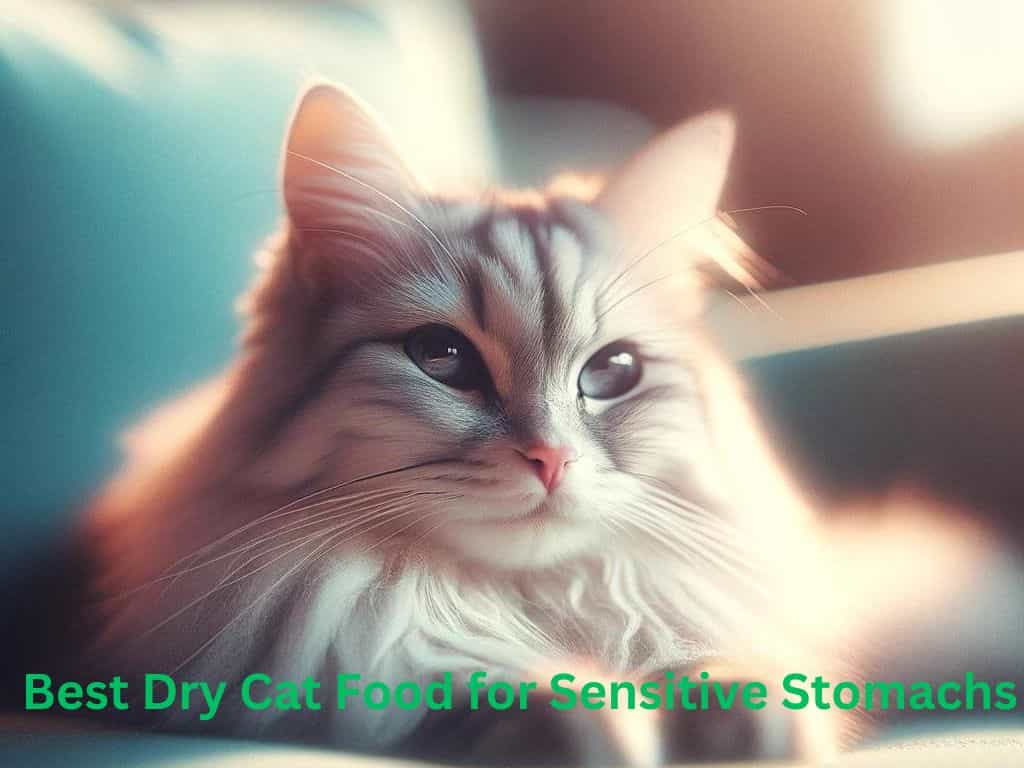
We must focus on ingredients that aid digestion and stomach health. The best ones are gentle on the gut and give nutrition. Ingredients that support a healthy gut flora are valuable. They also ensure smooth digestion.
1. Probiotics are live, helpful bacteria. They are key for gut health. They help break down food and absorb nutrients. Including probiotics in the diet can help balance the intestinal flora, which is crucial for digestive health.
2. Prebiotics are food for probiotics. They include inulin and fructooligosaccharides (FOS). Prebiotics help nourish and grow the beneficial bacteria in the gut. This symbiotic relationship between prebiotics and probiotics supports a healthy digestive tract.
3. Pumpkin: High in fiber and moisture, pumpkin is an excellent ingredient for aiding digestion. It can help regulate bowel movements. It is gentle on the stomach. So, it’s ideal for those with sensitive digestion.
4. Ginger: Known for its anti-inflammatory properties, ginger can help ease stomach discomfort, reduce nausea, and promote smooth digestion. It’s a natural remedy that supports gastrointestinal health.
5. Lean Proteins: digestible proteins, such as chicken, turkey, and fish, provide essential nutrients without taxing the digestive system. They are fundamental for muscle maintenance and health.
6.Omega-3 Fatty Acids: Found in fish oil and flaxseeds, omega-3 fatty acids are beneficial for reducing inflammation throughout the body, including in the digestive tract, which can help reduce symptoms of digestive upset.
Adding these ingredients to the diet can aid digestion. They also help the stomach. This ensures better health.
Reviews and comparisons of top dry cat food brands formulated for sensitive stomachs
When exploring dry cat food brands for sensitive stomachs, several top contenders emerge. Each offers unique benefits tailored to support digestive health.
1.People praise Hill’s Science Diet Sensitive Stomach & Skin for its digestive health support.
It does this by combining easy-to-digest ingredients with added vitamins and minerals. These boost skin and coat health. Veterinarians often recommend this brand. They like its science and clinical support.
2.Royal Canin Digestive Care stands out.
It focuses on improving stool quality and digestion with easy-to-digest proteins and a special blend of fibers. It’s designed to help cats process their food more , reducing the chances of digestive upset.
3.Blue Buffalo Sensitive Stomach emphasizes natural ingredients.
Real meat is the first ingredient. It is supplemented with prebiotics and probiotics to support gut health. This option is great for pet owners looking for a more holistic approach to their cat’s dietary needs.
All three brands rank high-quality, easy-to-digest ingredients. They are tailored to sensitive stomachs. But, they differ in how they approach nutrition. They vary in protein sources, fiber content, and the use of natural vs. formulated ingredients. Picking the right brand depends on a cat’s specific needs. It also depends on their dietary preferences and the pet owner’s views on nutrition.
Pros and cons of homemade versus store-bought dry cat food options for cats with sensitive stomachs
Making cat food at home lets you fully control the ingredients. This lets cat owners avoid substances that may upset their pet’s sensitive stomach. It allows customization to match the cat’s diet. This leads to better digestion. Yet, the cons include the time, effort, and knowledge required to ensure the diet is complete. Homemade diets often lack the precise balance of nutrients cats need, which can lead to deficiencies over time.
Store-bought dry cat food is balanced to meet a cat’s nutritional requirements. This is especially true for those formulated for sensitive stomachs. These diets are convenient, need less preparation time, and are often enriched with supplements to support health. The downside is the potential for additives or ingredients. These might not suit all cats with sensitive stomachs. Additionally, the cost of high-quality, specialized formulas can be higher than standard cat food. Choosing between homemade and store-bought options depends on a mix of ease and nutrition. It also depends on the cat’s specific health needs.
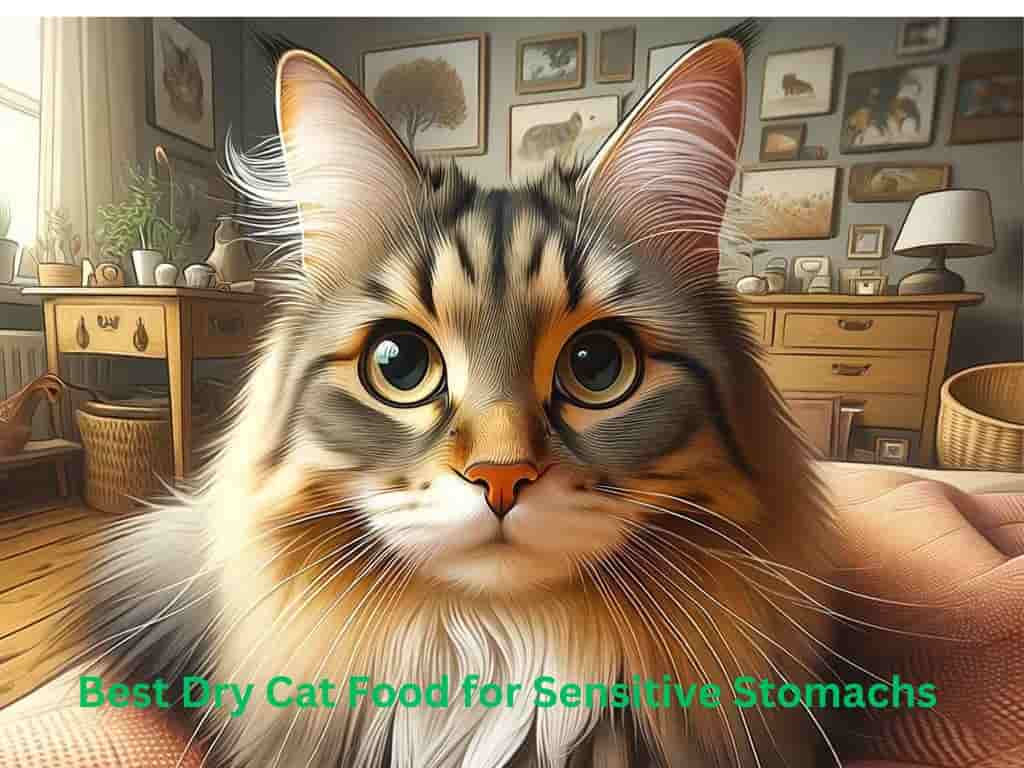
Tips and methods for transitioning a cat to a new dry food diet for sensitive stomachs
Moving a cat to a new dry food diet is hard. This is especially true for those with sensitive stomachs. It needs patience and careful planning to avoid stomach upset. Start by mixing a small amount of the new food with the current diet, increasing the proportion of new food over a period of 7 to 10 days. This slow integration helps the cat’s digestive system adjust without causing distress.
Monitoring your cat’s response to the new diet during the transition is crucial. Look for signs of stomach discomfort, such as vomiting or diarrhea. Then, adjust the transition pace. If adverse reactions occur, consult a veterinarian—they may suggest a slower transition or a different food option.
Make sure to have fresh water at all times. Also, consider feeding smaller, more frequent meals. This will aid digestion. Maintain consistency once the transition is complete. This is to avoid more sensitivity issues. It will reinforce a stable diet for your cat’s sensitive stomach.
Commonly asked questions about choosing and feeding dry cat food for sensitive stomachs
What makes a dry cat food good for sensitive stomachs?
Dry cat food for sensitive stomachs has digestible proteins. It has few ingredients to cut allergen exposure. It also has added fibers to support digestive health. Probiotics and prebiotics may also be included to maintain a healthy gut flora.
How do I know if my cat has a sensitive stomach?
Signs of a sensitive stomach include vomiting and diarrhea. It can also cause constipation, gas, or changes in appetite. If you notice these symptoms, ask a vet. They can rule out health issues.
Can changing foods cause stomach sensitivity?
Yes, abrupt changes in your cat’s diet can lead to digestive upset. It’s important to transition to new foods over 7 to 10 days to allow your cat’s digestive system to adjust.
Is grain-free food better for cats with sensitive stomachs? Not . While some cats may enjoy a grain-free diet, others may not need it. The key is high-quality, digestible ingredients. Consult with a vet to determine the best dietary approach for your cat’s specific needs.
Conclusion: Summary of key points and final thoughts on selecting the best dry cat food for sensitive stomachs
Picking the best dry cat food for sensitive stomachs is vital. It ensures that pet owners keep their cats comfortable and healthy. Understanding the needs of cat’s nutrition is crucial. Also, recognizing signs of their digestive sensitivities are key first steps. Look for cat foods with high-quality, easy-to-digest proteins. They should have a few ingredients to reduce the risk of allergic reactions. They should also have fibers that support gut health. Including probiotics and prebiotics can further enhance digestive wellness.
Transitioning your cat to a new diet should be done to avoid upsetting their stomach further. Watching how your cat reacts to the new food. Also, talking to a vet can give you personalized advice and reassurance. The goal is to find a dry cat food that eases digestive issues. It should also boost health and well-being. This will make meal times a joy for your sensitive-stomached cat.






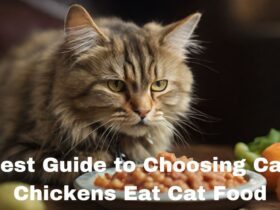







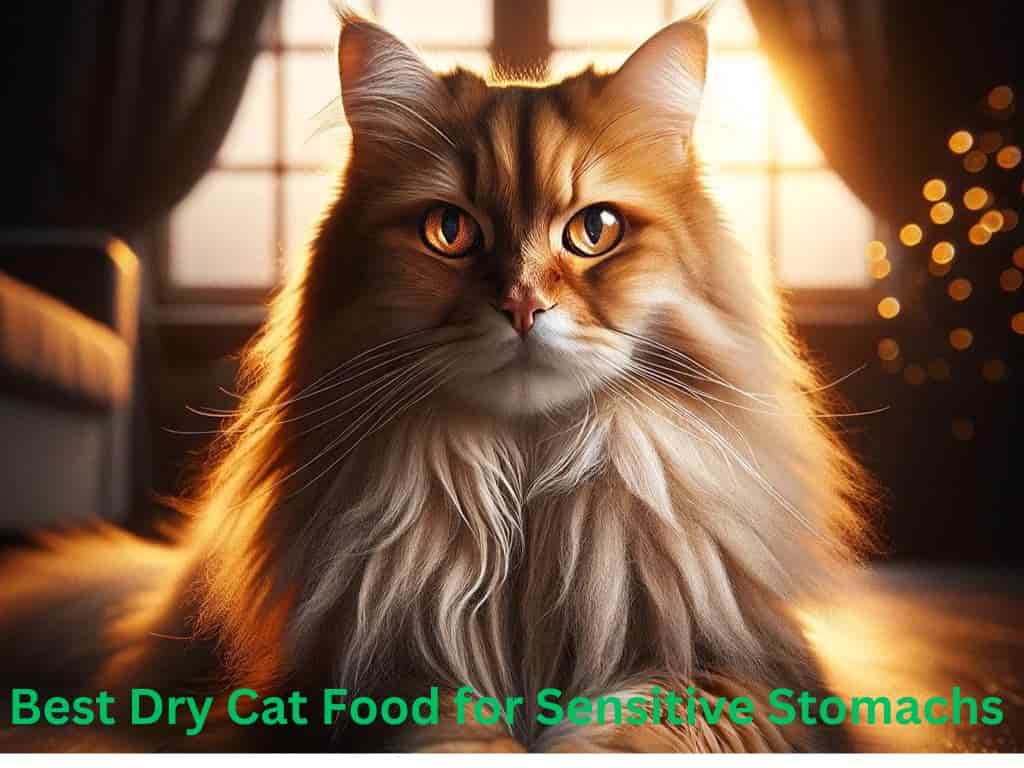
Leave a Review